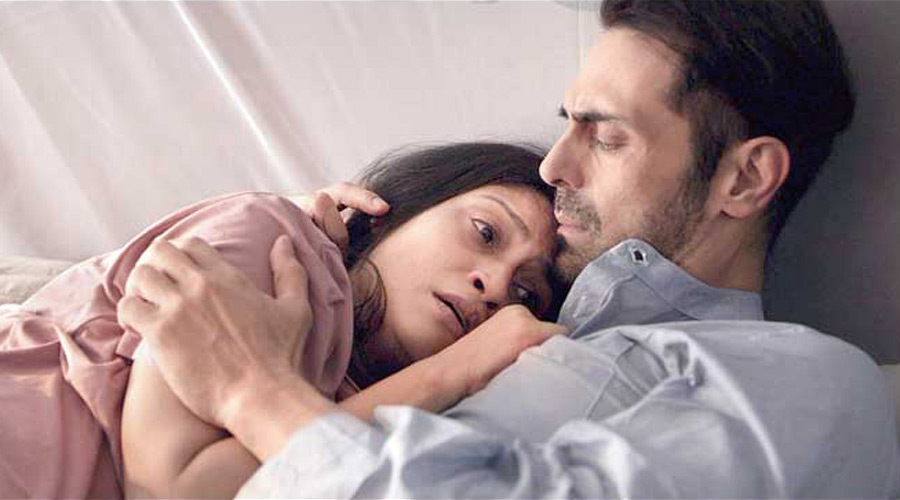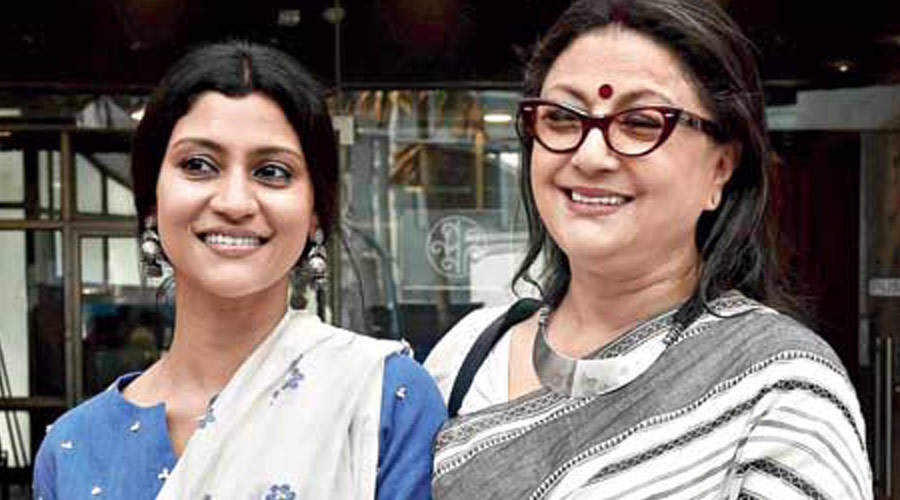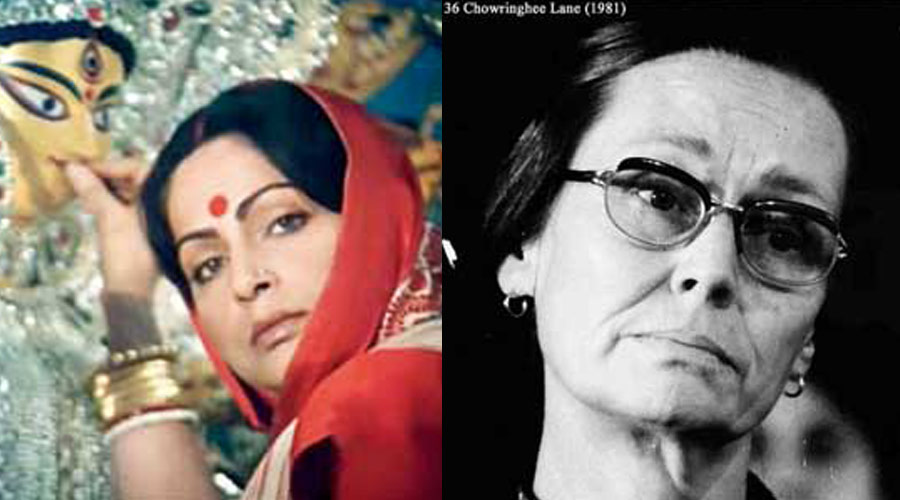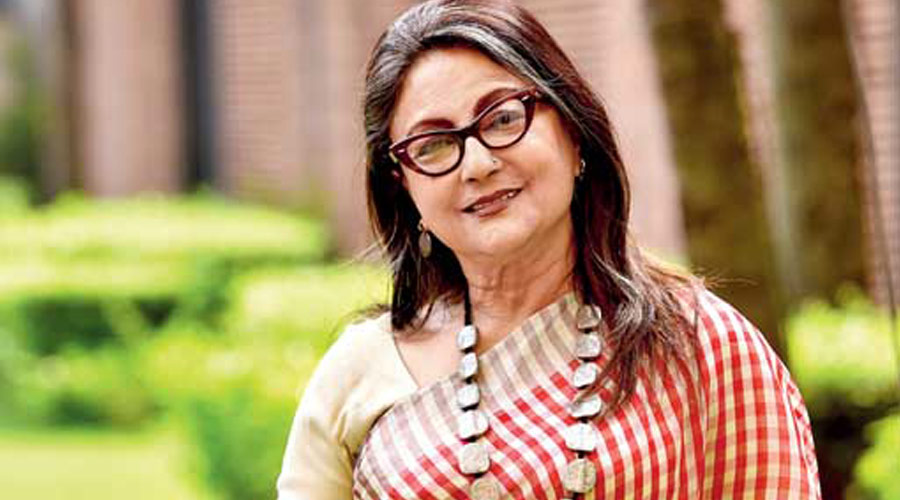Conversing with Aparna Sen is both an engaging and an enriching experience. A few days before her latest film The Rapist won the prestigious Kim Jiseok Award at the Busan International Film Festival, I found myself seated across a table at ITC Sonar with Sen, who at 75, still has an insatiable appetite to tell stories. Dressed in a beautiful red-and-white gamchha sari, Sen still exudes film-star glamour, but it’s film-making that her heart truly beats for now.
Over close to an hour, we spoke about The Rapist, that stars her daughter Konkona Sensharma, along with Arjun Rampal and Tanmay Dhanania, what spurs her as a storyteller and why she isn’t afraid to live life on her own terms.
I believe that you have lived with the story of The Rapist for a very long time...
Ya, the germ of the story came to me a long, long time ago. I don’t know whether it came to me after the Nirbhaya case (the Delhi gangrape of 2012) or before... I can’t remember now. It’s been there with me but it’s something I thought there wouldn’t be any takers for. In fact, Shabana (Azmi, actor) had made some very dire predictions when I told her the story (laughs). She told me, ‘Not even one crore will see it’. I think she’s withdrawn those predictions now (laughs).
So what made you want to make it eventually?
The OTT platforms have given us, as viewers, so much exposure. It’s said that travel broadens the mind. With the content that we have consumed of late, we have been exposed to different countries, cultures, ethnicities and spaces. How free they are or how bound they are... films are showing us that. The mindset of people has changed. This story has been marinating within me for a long time. And all the cases that have happened since Nirbhaya have added to the marinade, so to speak.
Do you think you could have made a film like this even five years ago?
I am not sure. Four or five years ago, maybe. Shrikant Mohta, the producer of my last film Ghawre Bairey Aaj, is very broad-minded and when I had told him the story of The Rapist at that time, he was very excited about it. He told me, ‘If you have thought of it in Delhi, you must set it in Delhi, and you must do it in Hindi’. But that was also something he told me that they couldn’t afford unless I could bring in stars. I am happy I set it in Delhi and made it in Hindi.

Konkona Sensharma and Arjun Rampal in The Rapist
What made you want to tell this story from the other point of view, so to speak?
It’s not the other point of view, to be honest, it’s an exploration. What was the germ of the idea and set me on this path was, ‘Why does a man become a rapist?’ He is not born a rapist. He goes through infancy, childhood, youth with a fair amount of innocence. Is it his surroundings that make him like this? Is it some incident in his childhood? Is it genetic? These are the questions that were in my mind, and these are the questions I have put into the film.
This is not a case of me preaching for or against anything. I don’t take any sides. In fact, Variety magazine said that this is such a matter-of-fact film where no sides are taken. Every character has many shades of grey. And I take that as a tremendous compliment because that was my intention for the film.
I didn’t want the film to be sentimental in any way. I am not justifying rape or the rapist. I am not even saying that this or that should be the penalty for rape. It’s an exploration of why people rape. Even if they have had very extenuating circumstances in their childhood, rape can never be justified.
But correctional devices are possible. Over here, people just bay for blood. Suppose a man has raped and killed. It’s an open and shut case. He will either be given life imprisonment or the death penalty. So many countries have abolished the death penalty. Why? There must be a reason. I don’t think death penalty is the answer. But then what is the answer? Frankly, I don’t know. More than anything else, this film poses questions to the audience. It will be a conversation starter in many ways.
I am also deeply influenced by Alaknanda Chakladar (Roy). She’s a dancer who has open entry to Presidency Jail where the inmates call her ‘Ma’. Through dance and music, she has changed the lives of these people. One of those inmates called Nigel Akkara has acted in films, and gone back to jail at night. Think of what a fantastic reformist move this is. All these people want to live a different life.
There are two deeply feminist friends of mine. One is Anuradha Kapoor who heads Swayam over here and I talk to her a lot... she’s dealt with a lot of rape victims. I have spoken to doctors and lawyers, I have read books.... Then there is Soumita Dasgupta, another friend of mine who lives in New Jersey and heads this organisation called Manavi that deals with abused women from South Asia. I have been there and showed them another film of mine. Soumita told me about this new way of dealing with crime and criminals and that’s called restorative justice. That’s where the victim meets the perpetrator and they talk about why he or she did this, ultimately with the purpose of making them realise the devastation caused by their actions. The victim also attempts to understand and try and forgive the perpetrator. This is a correctional method which many countries have adopted. Ours is about the police encountering those arrested without giving them a fair trial and everyone claps and lauds the police. In that case, we don’t even need a judiciary. We can just have the police coming and killing people. Is this to be supported?
But in my film, I don’t even get into all this. My film is a story about three people (played by Konkona Sensharma, Arjun Rampal and Tanmay Dhanania) whose lives change dramatically after this horrific incident.
Did you always want to name it The Rapist?
Yes. It’s very straightforward, hard-hitting.... I thought calling it The Rapist would be interesting. One of the names that was suggested was ‘Prisoners’ because all the people in the film are sort of in their own different prisons. It’s a very nice title, but I felt that only a small number of people would understand the significance of it. Pinjar is a lovely name, but there’s already a film with a name like that.... Salaakhen was thought of, but even that exists. Finally, I thought that The Rapist is apt. It also has tremendous recall value.

Aparna Sen with Konkona Sensharma
As mother-daughter, director-actor, do you and Konkona have an unspoken understanding on set by now?
She tends to understand my directions by instinct, not only because we are mother and daughter but also because we have worked together in quite a few films by now. We started off with the telefilm Picnic, then Mr and Mrs Iyer, 15 Park Avenue, Goynar Baksho, Iti Mrinalini... that’s at least five films. On set, she asks me to demonstrate what I want in a scene and she takes the essence of it. She knows that even if Ma shows her something, she doesn’t have to copy me. And I don’t expect my actors to copy me. When I am unable to express myself in a certain way, that is when I act it out. And then suddenly, they get it. That happened with Arjun (Rampal) also.
On this film, we had a wonderful workshop director called Kanishka Agarwal who freed up the emotions of the actors. She made them do some exercises of going through anger, sadness, joy, laughter.... Some of the actors broke down, some fell on the carpet laughing.... I found that amazing. We only rehearsed some of the difficult scenes. Like the rape scene. We finished the film in just 27 days, which I am very happy about. I had a wonderful DoP (director of photography) in Ayananka Bose.
Since the time you directed Konkona last, she’s turned director herself with A Death in the Gunj. Was it different directing her this time around?
She puts her director’s cap away when she’s an actor on set. But because she’s very protective of me, on set she would sometimes tell me, ‘Ma, you are very tired. Have you noticed that there is nothing on that bedside table? Maybe you can ask them to put some medicine bottles or something’. And then I would wake up and say, ‘Oh ya, what was I thinking?!’ (Laughs) But even I have done that as an actor on other sets. I remember we were shooting the last scene of The Rapist. She was not in the scene, but she was present on set throughout the night and because I was so tired, I would keep falling asleep. And she would keep saying, ‘Ma, wake up. Have you seen this, have you seen that?’ (Smiles) All three of them — Arjun, Tanmay and Konkona — I hardly directed. They read the script thoroughly and it had it all. I write very detailed scripts.
You just said that you hope that The Rapist is a conversation starter. But don’t you think it’s too much to expect a film to bring about any kind of change or even spur off a conversation?
Well, you can’t make a film thinking of that. In my case, Parama (1985) did do that. There was a distinct change, which I noticed much later. I saw most women becoming pro towards sexual choice. I don’t know, but I feel that after The Rapist, there will be interesting conversations about the death penalty, about why rape happens, whether a criminal is born or created.... I haven’t tried to give any solution because I don’t know what the solution is. But if the film sets off a debate, then that will be my reward.

Jennifer Kendal in 36 Chowringhee Lane (left) and (right) Rakhee in Parama, both directed by Aparna Sen
What is it about the craft of film-making that still spurs you?
It’s the passion for telling stories. That spurs me every moment. Right from pre-production to post-production, I enjoy every moment of the film-making process. It gives me a high that nothing else does. Stories come to me germinally in terms of an idea, and then in the form of images. Like Parama, for instance, I didn’t have a story in the beginning. I am highly influenced by Girish Kasaravalli’s film Ghatashraddha, and I had this image of the archetypal adulteress with her head shorn, and then I worked that into the film... why is her head shorn, how is she hurt so that she has to have an operation... all these things came later. First, it was the image.
And that happens with every film?
Not always. It’s different with each film. Ghawre Bairey Aaj was based on (Rabindranath) Tagore’s novel but set in the contemporary world. The day I heard of Gauri Lankesh’s death, I was devastated. I couldn’t sleep that night. When I did, I dreamt that a young first-time film-maker was making a film on Tagore’s Ghare Baire and was a great admirer of Satyajit Ray’s film of the same name. He is now making Ghare Baire in the present political scenario. Once I woke up, I started writing the synopsis. Initially, it was supposed to be a film within a film. But then I thought it was encumbering the film and that I could tell a straight story. That’s what I did in that film.
Given the times we are living in, do you find it tough to keep your politics away from your films?
I don’t think there is a single person in the world who is apolitical... unless they are not aware of their surroundings or are extremely opportunistic. Each person has his or her own politics, whether it’s feminist politics, caste politics.... At least in the case of honest artistes, that comes out.
In Mr and Mrs Iyer, they (the characters played by Rahul Bose and Konkona) were not supposed to be Muslim and Hindu. It was just supposed to be a love story set during a journey. I don’t know how or why my characters take over... they tell me what they want to be. It’s a strange, magical thing. Miss Stoneham (played by Jennifer Kendal) in 36 Chowringhee Lane, in the original idea I had, was supposed to go away to her niece at the end of the film. But when I tried to write it, I couldn’t make her go. It just wouldn’t write.
Does it scare you to be a vocal film-maker and activist in today’s times?
I am not scared. What will happen? I have lived my life. I am 75. I have lived my life on my own terms without anything happening to me so far. Now they can put me in jail if they want to. But I am not saying anything drastic, and my films are never drastic.
My favourite Aparna Sen film is... Tell t2@abp.in
